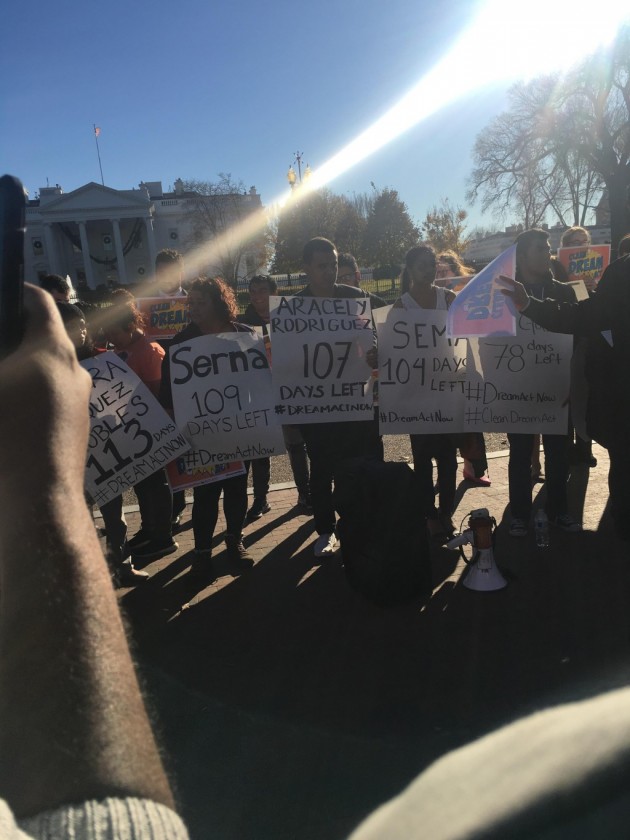Since the Rihanna and Chris Brown assault has escalated, light has been shed on many other domestic violence cases that evolved into more serious matters, like death.
Among these cases is the one of Erika Peters, a resident of the 2000 block of Maryland Ave., N.E. Peters, 37, along with her two sons, Erik Harper, 11 and Dakota Peters, 10, were found stabbed to death in their apartment on March 21. Peters’ boyfriend, Joseph R. Mays, 44, has been charged in the slayings.
In response to this tragic event, BET Networks’ special creative consultant, Michaela Angela Davis expressed great concern on the issue that is affecting a vast majority of black women across the nation, 22 times the rate of women of other races according to the American Bar Association Commission on Domestic Violence. With her recent appearance on BET’s presentation of “Hip Hop vs. America II: Am I My Sister’s Keeper?” Davis said that women are dying younger as a result of violent relationships with former or current partners.
“Homicide is the number one killer for black women 18 to 34 as a result of poverty and a lack of education,” Davis said. “Women can no longer allow themselves to be victimized physically, emotionally and mentally even if these factors do play roles in their lives.”
Davis, 45, said that she conducted a research on Chris Brown after hearing about the incident between him and Rihanna. After realizing that Brown’s mother was a victim of domestic violence, she said she could see why there is a rage in him and that he needs severe help. Davis also attributed the observation of violence in the home as a reason why many other young men abuse women.
“All of the adults on his payroll had to have seen his rage before and probably knew he has seen his mother being brutalized,” she said. “It’s impossible for him to grow stabilized after witnessing that without any help. It’s irrational to think children can raise themselves.”
In Davis’ research she found a link between domestic violence, witnesses of domestic violence and a correlation to poverty and a lack of education that explains why the cycle continues.
Barbara Glanton has been a pastor for the last 25 years. She was in an abusive relationship for five years that almost led to her death.
“I was so in love with a man that I allowed myself to be beaten, abused and held down to the floor with a gun down my throat,” Glanton said.
Glanton, 66, is the pastor of Love of Jesus Family Church in Newark, NJ. She said she finally got sick and tired of being abused and living an unhealthy lifestyle. She said she gives God all the glory for saving her and giving her a second chance.
“God has truly saved me from what was deemed to be my end,” she said. “I tell my congregation all the time that if a man can’t respect you and just wants to beat you down, you need to tell him toot-a-loot, bye.”
With church members following behind her vision, Glanton plans to open a home for battered women in the community.
“It is my mission to give these young women a place to stay and to get the help they need,” she said. “I want every woman who has been in my shoes to know that they do not have to endure abuse before it is too late.”
Like Glanton, Davis has also made it her duty to educate and help victims of domestic violence as well as address other issues concerning the black community. Davis’ mentoring initiative, Fly Girls, reaches out to young women in the New York Metropolitan area to encourage them to design who they are.
“We need to break the silence within our community and it starts with a simple conversation,” Davis said. “Fly Girls is designed to get that conversation going. If you own who you are, there are certain things that will not be acceptable to you and this is what we encourage our young women to do – own who you are.”
Along with Glanton and Davis, organizations like the Black Women’s Health Imperative and Jewels, Inc. are also making efforts to break the silence in communities all over the District. The Imperative, however, reaches women across the country of all ages.
“At the Imperative, we are doing a lot to support programming and legislation that will make changes in the lives of domestic violence victims,” said Health Program Manager Nadra Tyus.
Tyus, 33, who holds a doctorate in public health, has been formulating programs for women of all ages to affect the decrease of domestic violence death among black women. Working in public health for over 10 years, Tyus said that the Imperative is working to bring awareness to the community and as well as support the efforts of other programs. The Imperative reaches women between the ages of 18 and 34, which is the young women’s forum group.
“With the young women’s forums, we plan to discuss the issues that are affecting young women on a day-to-day basis,” Tyus said. “We feel as though we could definitely touch so many young women just by opening the floor for discussion and awareness.”
Besides, the Imperative, Jewels, Inc. is another organization taking action in the fight against domestic violence. Jewels, Inc.’s current president, Krystal Robertson said that the problem with young women in abusive relationships is that they lack self-worth, a stigma that Jewels, Inc. is striving to change within the District, where in 2005, according to DC Superior Courts 2004 – 2006 annual reports, domestic violence case filings totaled 8,386.
“Women with a low sense of self and a diminished self-worth will accept and continue the cycle of domestic violence because of an inability to choose their own health, safety and dignity over abuse,” Robertson said. “The purpose of Jewels, Inc. is to let our Junior Jewels and Tender Stones know that they are worth so much more than they could ever imagine.”
With the purpose of changing the negative connotation of being an urban girl, Jewels, Inc. mentors young girls in the District, ages eight to 18. Robertson, along with her fellow Jewels, plans to continue expanding the program throughout the District and other cities who they feel need it the most.
“With mentoring, I have the opportunity to change lives,” she said. “By instilling in my Junior Jewels the importance of self worth and self esteem, I’m also affecting the likelihood that they won’t allow emotional, psychological or physical abuse from any man because they truly know their worth.”



